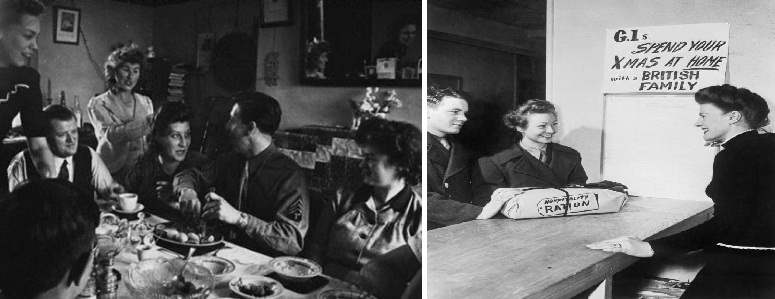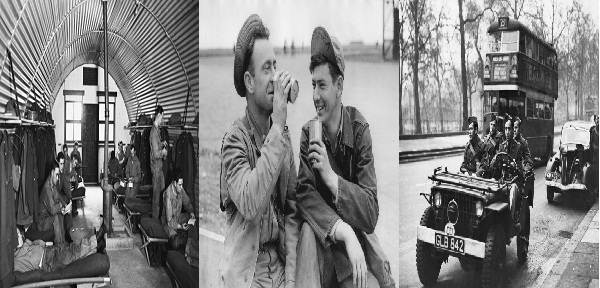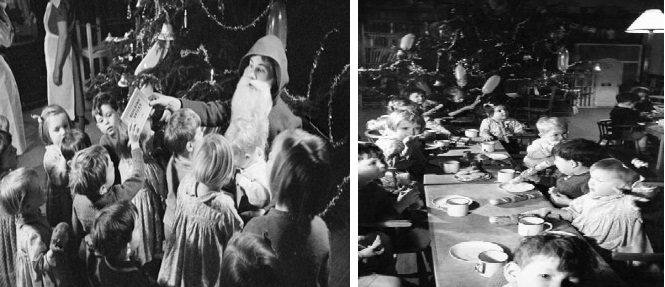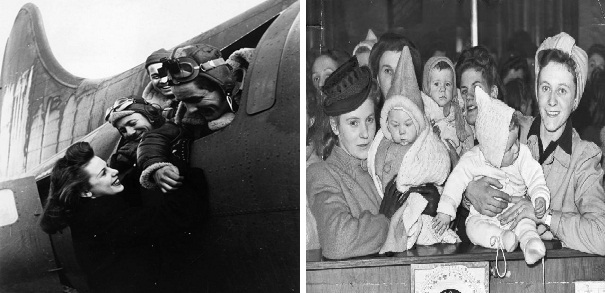
American GIs sent to Britain during the height of WWII were repeatedly described as “overpaid, oversexed and over here” but at least, on Christmas they made many a British families happy with their presence during the holiday celebrations. The main reason – they brought with them extra rations as well as the much sought after Coca Cola and nylon stockings.
With British soldiers away battling on the Western Front, their families left in Britain were encouraged to invite the US soldiers assigned in their land over to celebrate Christmas which they readily did because they knew the soldiers would be bringing extra food with them. As for the American GIs in the foreign land, it was their way of escaping the difficulties brought about by being away from home on an occasion that would have been spent best with families and friends.
About 60,000 GIs (or Government Issue) were sent to Britain come December most of whom were stationed in East Anglia where they build airfields for American planes.
Most of these American soldiers were given the day off come Christmas and were told to spend their holidays with British families as “fillers for the chairs left empty by British fighting men”.
Posters bearing the words, “GIs spend your Christmas at home with a British family” , were also put up around the bases.
For their part, the British families keen on having the WWII GIs in their homes for Christmas issued invites; every one GI was offered as much as 50 invitations. Those who accepted the offers brought special rations packs given them to share to families they were going to. These packs included items that were sought-after in those trying times – fruit juice, evaporated milk, bacon, coffee sugar, rice, peas and lard.
The many invites each GI received was majorly due to the fact that WWII and food rationing brought a drastic change to how Britons celebrated Christmas. The usual festivities had to be scaled down or done without because of the food restrictions and shortages brought about by war; even the most basic foods were scanty.
Gifts had to be homemade, children’s toys had to be fashioned using recycled materials.

the extra food the GIs brought with them would have been heaven to theses war-affected families.
“The ration is estimated at 50 invitations for every one soldier available,” said a US camp commander during the Christmas of 1942.
He even urged more GIs who were to spend their first Christmas within Britain “to accept some more of those invitations”.
As one GI recounted in the book “Overpaid, Oversexed, And Over Here: The American GI In World War II Britain” written by historian Juliet Gardiner, he went to one British woman’s home for Christmas riding a bicycle loaded with his Christmas rations of spam, powdered coffee, chocolate and soap along with other items he had taken from his camp stores.
“We all sat down to a Christmas dinner and scene that might have made Charles Dickens the only true recorder,” he said then added…
“I don’t recall what we had for dinner, but at long last the plum pudding was served – and I gained the silver sixpence.”
What Wartime Christmases were Like

The GIs did just brought along their rations when they went to spend Christmas with British families; they introduced American Christmas traditions as well like the Christmas crackers.
The British, on the other hand, acquainted their guests with their Advent calendars and candles.
One remarkable feature that peacetime Christmas and wartime Christmas had in common was the singing of songs and carols. 1939 saw the start of BBC’s special Christmas Day radio program which included a speech from the king, an affair that has become a yearly Christmas occurrence until this day.
The Americans were also known for throwing extravagant Christmas parties during Christmas times at their Army and air bases as a way of helping British families forget their wartime difficulties. They mostly invite school children from the locality to join in the festivities.
At one time, war orphans were invited to a party prepared by the US Army soldiers of the 3120th Signal Service Battalion which was held at the Salvation Army War Emergency Home in Lady Templemore’s estate, Alresford, Gloucestershire.
These children were targeted and made the guest of honors in the said celebration as Christmas was most trying for them – they were not only away from home, they also had to deal with the loss of a loved one whether in action or through the bombings raids done by the enemy which happened frequently throughout WWII.
A guest of another party thrown by the GIs for school children in the Town Hall of Middlesbrough recalled how the youngster each received a gift from an American-accented Santa.
“The G.I.s had decorated the interior with lots of flags, Stars and Stripes and Union Jacks, together with tinsel and paper chains.
They served an immense amount of food, not only the cakes, jellies and blancmange but many sweet dishes that we hadn’t seen for ages due to rationing,” he recounted.
The GIs even showed enthusiasm in decorating their bases for the holidays by hanging “chaff”, the strips of metallic foil they would often throw from their planes to mislead German radars; to trees to the other more traditional holiday decors like lights and streamers.
GIs and Britain

When GIs first arrived on British shores in 1942, they had brought with them Coca Cola, nylons, chewing gums and cigarettes which were considered luxury items by their British counterparts.
At first, the Brits distrusted their American counterparts.
They were paid five times more than the British soldiers that was why they could afford to be very generous and this trait had rendered them attractive to many British women.
About 70,000 British women became GI brides; it was even estimated that over 9,000 babies were born illegitimately because of GIs love affairs.
At the end of the Second World War, free passage were offered to British GI wives by the US Army so that they could get to their new homeland and start anew with their husbands. Nevertheless, their journey to their new homes was not without difficulties.At one time, their trip was cancelled because of bad weather and they had to wait for a ne opportunity to make it to America.
By the time WWII ended, about three million GIs were assigned in Britain and had carried on the moniker “overpaid, oversexed and over here”.